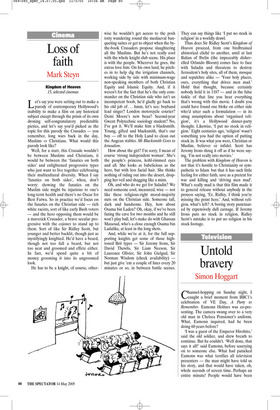Loss of faith
Mark Steyn
Kingdom of Heaven 15, selected cinemas
Let’s say you were setting out to make a parody of contemporary Hollywood’s inability to make a film on any historical subject except through the prism of its own droning self-congratulatory predictable pieties, and let’s say you’d picked as the topic for this parody the Crusades — you remember, long wars back in the day, Muslims vs Christians. What would this parody look like?
Well, for a start, this Crusade wouldn’t be between Muslims and Christians, it would be between the ‘fanatics on both sides’ and enlightened progressive types who just want to live together celebrating their multicultural diversity. When I say ‘fanatics on both sides’, whoa, don’t worry: showing the fanatics on the Muslim side might be injurious to one’s long-term health and there’s no Oscar for Best Fatwa. So in practice we’d focus on the fanatics on the Christian side — rich white racists, sort of like early Bush voters — and the hero opposing them would be a maverick Crusader, a brave secular progressive with the cojones to stand up to them. Sort of like Sir Ridley Scott, but younger and better backlit, though just as mystifyingly knighted. He’d have a beard, though not too full a beard, but not too neat and groomed and effete either. In fact, we’d spend quite a bit of money grooming it into its ungroomed look.
He has to be a knight, of course, other wise he wouldn’t get access to the posh totty wandering round the mediaeval banqueting suites or get to object when the bythe-book Crusaders propose slaughtering all the Muslims. But he’s not really cool with the whole knight club scene. His place is with the people. Wherever he goes, the extras love him. On his own land, he pitches in to help dig the irrigation channels, working side by side with minimum-wage non-speaking members of both Christian Equity and Islamic Equity. And, if it weren’t for the fact that he’s the only commander on the Christian side who isn’t an incompetent boob, he’d gladly go back to his old job of ... hmm, let’s see: boyband lead singer? London motorcycle courier? Demi Moore’s new beau? Second-year Gwent Polytechnic sociology student? No, I’ve got it. We’ll make him a blacksmith. Young, gifted and blacksmith, that’s our boy — off to the Holy Land to clean out the Augean stables. Mr Blacksmith Goes to Jerusalem.
How about the girl? I’m sorry, I mean of course ‘strong independent woman’. She’s the people’s princess, kohl-rimmed eyes and all. She looks as babelicious as the hero, but with less facial hair. She thinks nothing of riding out into the desert, dropping her veil and shagging like a minx.
Oh, and who do we get for Saladin? We need someone cool, measured, wise — not like these religious-right moral-majority nuts on the Christian side. Someone tall, dark and handsome. Hey, how about Osama bin Laden? Oh, okay, if we’ve been faxing the cave for two months and he still won’t play ball, let’s make do with Ghassan Massoud, who’s a close enough Osama bin Ladalike, at least in the long shots.
And, while we’re at it, for the full supporting knights get some of those hightoned Brit types — Sir Jeremy Irons, Sir David Thewlis, Sir Liam Neeson, Sir Laurence Olivier, Sir John Gielgud, Sir Norman Wisdom (check availability) but just give ’em a couple of lines every 20 minutes or so, in between battle scenes. They can say things like ‘I put no stock in religion’ in a worldly drawl.
Thus does Sir Ridley Scott’s Kingdom of Heaven proceed, from one birdbrained ahistorical cliché to another, until at last Balian of Ibelin (the impeccably dishevelled Orlando Bloom) comes face to face with Saladin and threatens to destroy Jerusalem’s holy sites, all of them, mosque and sepulchre alike — ‘Your holy places, ours, everything that drives men mad.’ Hold that thought, because certainly nobody held it in 1187 — and in the false tinkle of that line you hear everything that’s wrong with this movie. I doubt you could have found one bloke on either side who’d utter such a formulation — in its smug assumptions about ‘organised religion’, it’s a Hollywood dinner-party thought. Likewise, ‘I put no stock in religion.’ Eight centuries ago, ‘religion’ wasn’t something you had the option of putting stock in. It was what you were, Christian or Muslim, believer or infidel. Scott has Jeremy Irons shrug it off as if he were saying, ‘I’m not really into movies.’ The problem with Kingdom of Heaven is not that it’s hostile to Christianity or sympathetic to Islam but that it has such little feeling for either faith, save as a pretext for war and killing and ‘driving men mad’. What’s really mad is that this film made it to general release without anybody in the process saying, ‘Er, Ridley, I think you’re missing the point here.’ And, without religion, what’s left? A boring story punctuated by expensively dull carnage. If Jeremy Irons puts no stock in religion, Ridley Scott’s mistake is to put no religion in his stock footage.


































































 Previous page
Previous page